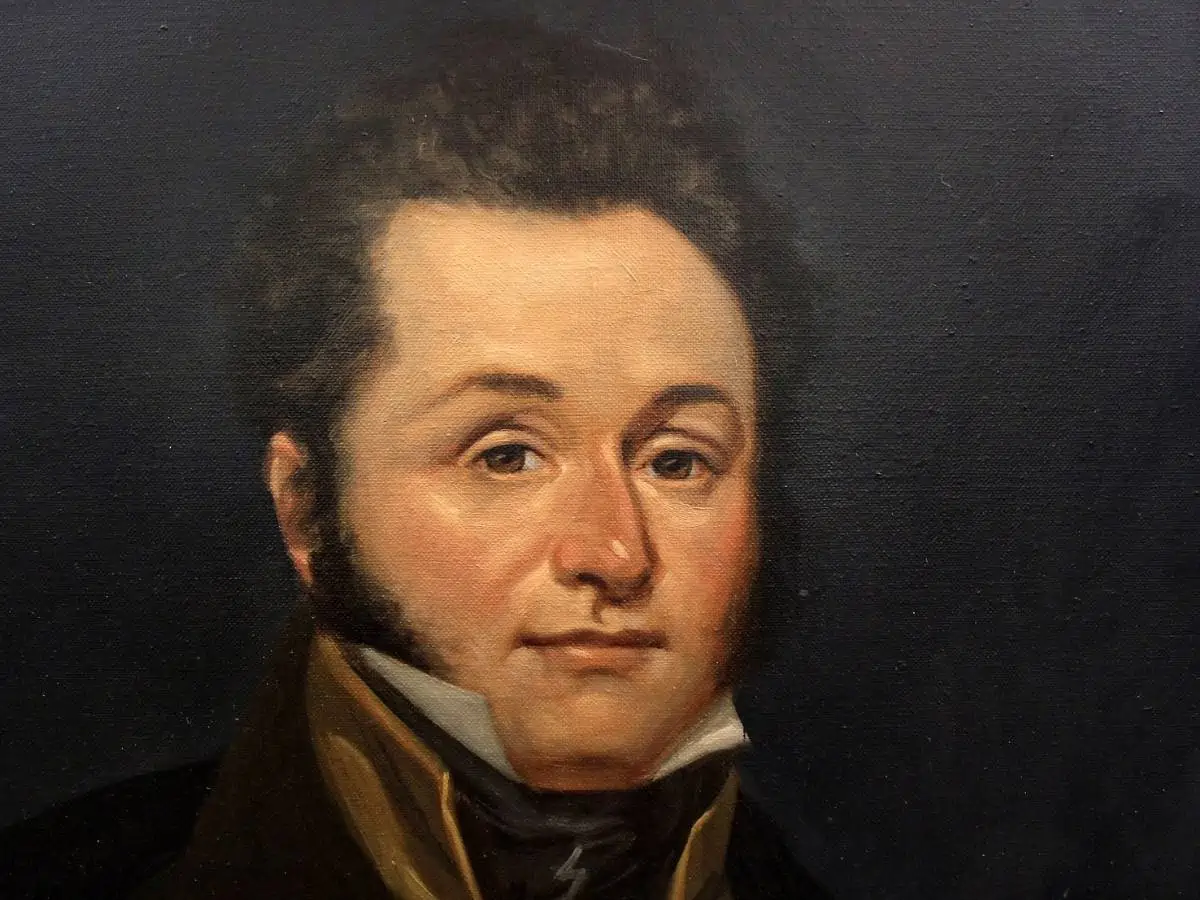Share the post "Lorenzo de Zavala (Vice President of the Republic of Texas)"
In 1835, a rebellion in Texas led a fight for independence against the centralist government of Texas. In 1836, Texas seceded from Mexico, becoming an independent country until 1845. One of the notable figures that took part in this fight for independence was Lorenzo de Zavala.
Lorenzo de Zavala was a Mexican author, politician, physician, and diplomat. He’s best known for his role in Texas independence and as the Republic of Texas’ first vice president. Today, Zavala is regarded as a Tejano and a Texas patriot.

Childhood and Early Years of Lorenzo de Zavala (1788-1819)
Lorenzo de Zavala was born in Tecoh, near Mérida, Yucatán, Mexico, on October 3, 1788. He was the fifth of nine children. Aside from that, there isn’t much available information on the years before his graduation.
- His grandfather moved from Peru to the Yucatán peninsula
- His father was a notary
- He was the fifth of nine children
- He attended the Tridentine Seminary of San Ildefonso in Mérida
Family Background
Zavala’s grandfather immigrated to Yucatán from Peru, making him a third-generation Yucatecan, and his parents “criollos,” Spanish Basques born in Mexico.
Zavala’s father worked in Spanish-speaking countries as a legal representative.
Education
Zavala received his education at the Tridentine Seminary of San Ildefonso in Mérida, Yucatán’s provincial capital. He studied Latin, classical philosophy, morals, and scholastic theology. He then received his diploma in 1807.
Lorenzo de Zavala’s Career (1819-1834)
Lorenzo de Zavala lived a life full of remarkable achievements that left their imprint on history. He was a prolific writer, a qualified physician, and a liberal politician. Throughout his career as a politician, Zavala held a variety of positions.
| Position | City/Country |
| Secretary of Yucatán | Yucatán, Mexico |
| Representative Governor of Yucatán | Madrid, Spain |
| President of the Constituent Congress | Yucatán, Mexico |
| Minister of Finance | Mexico |
| Governor of the State of México | State of México, Mexico |
| Minister to France | France |
| Interim Vice President | Republic of Texas |
Writing Career
Zavala’s writing career is intertwined with his political career. After his graduation, he founded and wrote for a newspaper called “The Universal Critic” and other newspapers in which he espoused democratic reforms.
During his exile, Zavala wrote “Journey to the United States of North America.” It was a travelog about the American political system and culture from the perspective of a Mexican. He also authored the two-volume “Historical Essay of the Revolutions of Mexico from 1808 to 1830.”
Zavala was also part of writing several constitutions: the Mexican Constitution of the Centralist Republic of Mexico and the Constitution of the Republic of Texas.
Medical Career
Many of Zavala’s writings criticized the Spanish rule. As a result, he was imprisoned for three years by the Spanish Crown, during which time he studied medicine and English.
After reading and studying medical textbooks, he had gained enough knowledge to begin practicing after his release from prison. For two years, Zavala worked as a physician in Mérida.
Political Career
From a young age, Zavala was a liberal intellectual, and his democratic ideas would serve as the foundation of his political career for the rest of his life.
His affiliations with politics began after graduating. He was vocal about his democratic beliefs and his dismay with the Spanish rule, which led to his imprisonment from 1814 to 1817.
Sometime after his release, Zavala started his political career as Yucatán’s secretary. The Cortes in Madrid then appointed him as governor of the state.
When Mexico gained independence from Spain in 1821, Zavala returned to his post as secretary of the state, during which he helped draft the constitution. Then, from 1824 to 1826, he was the President of the Constituent Congress and the first to sign the Mexican Constitution.
In 1829, Zavala served as Minister of Finance for six months before the government was overthrown and he fled to the United States to live in self-imposed exile.
Three years later, Zavala returned to Mexico as governor of the State of México. President López de Santa Anna then appointed Zavala to the position of Minister to France. He didn’t stay in this post long as he became discontent with the president’s dictatorial rule and disregard for the Mexican constitution.
Lorenzo de Zavala’s Contribution to Texas Independence (1835-1836)
Lorenzo de Zavala resigned in 1834 as Minister of France in protest of President López de Santa Anna’s government and renounced the President. In 1835, Zavala relocated his family to Texas, where he owned land, for his and his family’s safety.
There, Zavala became an advocate for establishing Texas as a separate Mexican state. Before long, however, he changed his position to advocate for complete independence from Mexico.
While López de Santa Anna was trying to capture and deport Zavala back to Mexico, Zavala was proving to be a valuable ally in Texas.
- He signed the Texas Declaration of Independence
- He helped draft the constitution of the new Republic of Texas
- He became the first vice president of the Republic of Texas
Signing the Texas Declaration of Independence
In March 1836, Zavala met with 58 delegates for the Convention of 1836 in a Texas settlement known as “Washington-on-the-Brazos.”
During the convention, members, including Zavala, drafted and signed the Declaration of Independence for the Republic of Texas.
Zavala is said to have proposed a flag design for the new republic during the convention. The flag was allegedly blue with a five-point white star and the letters “T E X A S” written between the points. However, there’s no official description or record of the flag’s design.
Drafting the New Republic of Texas Constitution
Zavala had legislative, ministerial, and diplomatic experience. He was also the only member with constitution-drafting experience. So, naturally, he helped write the constitution of the new Republic of Texas.
Becoming the Vice President of the Republic of Texas
After the Convention of 1836, Zavala was appointed as the first vice president of the provisional government of the Republic of Texas. However, due to health issues, he had to resign in October of the same year.
On November 15, 1836, Zavala passed away in what is now Harris County, Texas.
Lorenzo de Zavala’s Legacy
In modern-day Texas, Zavala is a state hero. That’s why he has a county, a city, and a village named after him. His name also appears on many public buildings and schools, as well as organizations and programs, including:
- Texas State Library and Archives Commission
- Zavala Hispanic Cultural Initiative
- Lorenzo de Zavala Elementary School
- Lorenzo de Zavala Youth Legislative Session
It’s worth noting that many Mexican historians see Zavala through a polarizing lens. On the one hand, they acknowledge Zavala’s intellectual and political contributions to the nation’s early history. On the other hand, they regard Zavala as a traitor because of his participation in the Texas Independence.
Lorenzo de Zavala FAQs
Is Lorenzo de Zavala a founding father of Texas?
Lorenzo de Zavala isn’t officially recognized as a Texas founding father. Nonetheless, Texans regard him as a founding father for his invaluable contribution to the Republic of Texas’ independence.
What is Lorenzo de Zavala’s relationship to Adina Emilia de Zavala?
Adina Emilia De Zavala is Lorenzo de Zavala’s granddaughter. She’s best known for her pivotal role in preventing the demolition of the Alamo and preserving it as a historic site. She also authored the large collection of documents preserving Texas history and the De Zavala family history, which can be found at the University of Texas and the University of the Incarnate Word.
References:
- Lorenzo de Zavala: tsl.texas.gov
- Adina Emilia De Zavala’s contribution to Texas history: tshaonline.org
- Lorenzo de Zavala and his impact on Texas: youtube.com
Share the post "Lorenzo de Zavala (Vice President of the Republic of Texas)"
Christian Linden is a seasoned writer and contributor at Texas View, specializing in topics that resonate with the Texan community. With over a decade of experience in journalism, Christian brings a wealth of knowledge in local politics, culture, and lifestyle. He holds a Bachelor's degree in Communications from the University of Texas. When he's not writing, Christian enjoys spending weekends traveling across Texas with his family, exploring everything from bustling cities to serene landscapes.











